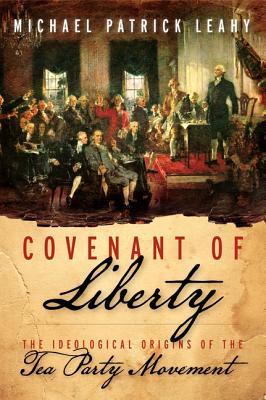
Covenant of Liberty
The Ideological Origins of the Tea Party Movement
کتاب های مرتبط
- اطلاعات
- نقد و بررسی
- دیدگاه کاربران
نقد و بررسی

January 9, 2012
Leahy, an early activist and new media champion of the Tea Party, systematically and reasonably defends the movement as more than a flash in the pan, and suggests that it has its roots in the limited government ethos of Jefferson and the founding fathers. According to Leahy, the federal government has historically broken four key promises that the founders agreed to in principle: to abide by the written words of the Constitution; refrain from interfering with free markets; uphold the traditions and customs of the “fiscal constitution”; and commit to thoughtful deliberation in Congress. Leahy (Rules for Conservative Radicals) pinpoints when each of these promises of the “secular covenant” were broken and its consequences. The book describes how the current movement began with CNBC correspondent Rick Santelli’s “rant heard round the world” about TARP bailouts, which led to hundreds of rallies in April 2009, and election of candidates in 2010. Though thick with references, statistics, and stories from the 1600s to the present, the book is peppered with vivid character descriptions. However, Leahy meanders rather than focusing on the topic of each chapter. Substantial enough to be a primer on the movement, the book may convince skeptical readers to see the benefits of less government and more free markets. Agent: Don Fehr, Trident.

March 1, 2012
A prominent Tea Party voice examines the roots of modern conservative populism. Leahy begins his identification of the ideological forebears of the Tea Party in 17th-century England with John Lilburne, fierce opponent of the absolutism of both Charles I and Cromwell and a champion of individual liberty who prefigured American colonials like Roger Williams and Anne Hutchinson. England's famed jurist Edward Coke and philosopher John Locke helped supply the intellectual framework that informed the American Revolution, inspiring the likes of Samuel Adams, Patrick Henry and Thomas Jefferson. Through these men Leahy (Rules for Conservative Radicals, 2009, etc.) traces the various philosophical threads woven into the Constitution, all intended to safeguard individual freedom against the encroachments of a centralized government. From the time of the document's ratification, though, Leahy's story is one of almost unrelenting constitutional apostasy. He starts with Hamilton, according to the author the first of our leaders who didn't feel especially bound by the secular covenant of the Constitution. Expanding federal control, selecting economic winners and losers, intruding into private lives, ignoring the Constitution's written words, failing "to honor the customs, traditions and principles that comprised the 'fiscal constitution, ' " Hamilton's successors have been as varied as Henry Clay, William Jennings Bryan, Woodrow Wilson, Herbert Hoover and FDR. LBJ, Nixon, George W. Bush and Barack Obama have continued the project of undermining the Constitution, treating it as outdated, inefficient or simply inconvenient. There's a more complicated political and intellectual history than Leahy presents here, but his goal is neither nuance nor completeness. Rather, it's to draw a straight line from the past to today's Tea Party, whose emergence he briefly discusses. Effectively establishes the ideological bona fides of a movement too easily caricatured.
COPYRIGHT(2012) Kirkus Reviews, ALL RIGHTS RESERVED.

























دیدگاه کاربران